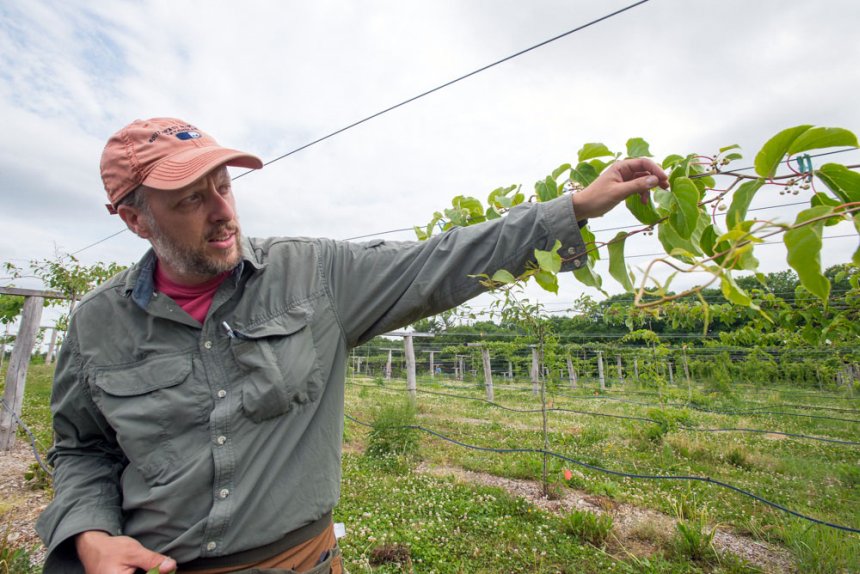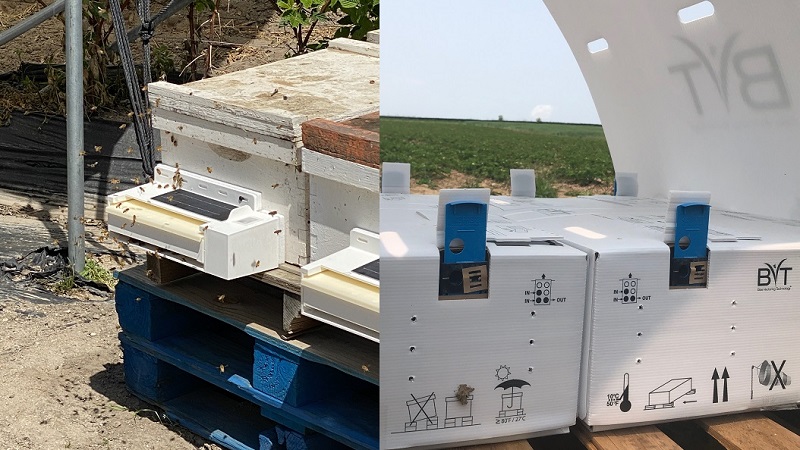New Hamshire University To Study Feasiblity Of Cold-Hardy Kiwiberry

Iago Hale, a researcher with the New Hampshire Agricultural Experiment Station, is part of a team who received a USDA Rural Business Development Grant for $38,000 to conduct a market feasibility study to assess the viability of cold-hardy kiwifruit. (Photo credit: University of New Hampshire)
Iago Hale, a researcher with the New Hampshire Agricultural Experiment Station, and Seth Wilner, a specialist with University of New Hampshire Cooperative Extension, have received a USDA Rural Business Development Grant for $38,000 to conduct a market feasibility study to assess the viability of cold-hardy kiwifruit, or kiwiberries, as a novel, high-value horticultural crop that could spur economic development among small farms in northern New Hampshire.
Hale established a kiwiberry breeding program at the NH Agricultural Experiment Station in 2013, with initial work focusing on characterizing and evaluating for the first time the entire North American collection of cold-hardy kiwis, nearly 200 in number, to identify promising varieties for the region and parent plants for new variety development.
Cold-hardy kiwi fruits are a nutritionally dense superfood with high levels of vitamin C, beta-carotene, anthocyanins, and lutein. The berry-like fruits, harvested in the early fall, are also flavorful, given their thin edible skins and pleasing balance of sugars and acids. With their general adaptation to the region, their attractive appearance, intense and complex flavor profiles, high levels of bioactive compounds, and easy consumability, kiwiberries have been recognized as economically promising in New England as early as the 1950s.
“New England fruit and vegetable agriculture is distinct in both the diversity of its production and its high proportion of direct sales to consumers. The large and growing demand for diverse, local produce in the region presents an opportunity for developing and introducing entirely new horticultural products, such as kiwiberries,” said Hale, a plant breeder and assistant professor of specialty crop improvement at UNH’s College of Life Sciences and Agriculture.
“Based on their adaptation to the region, their great flavor, and their suitability for direct marketing, kiwiberries show promise as a high-value horticultural crop for northern New England growers who face distinctly challenging growing and marketing conditions,” he said.
By surveying both consumers and producers, the project aims to develop a business plan to support the decision making of potential kiwiberry producers in the region. Results of the study also will be used to set cultivar and production system performance goals for the breeding program so that it may better support those growers investing in this innovative crop.
Hale is already working with several northern New Hampshire farmers in Coös County who are interested in diversifying their crops with hardy kiwis. One of those farmers is Kitty Kerner, whose family operates WinterGreens Farm and Aquaponics in North Stratford. The family has been working to expand its selection of high-value crops, and according to Kerner, “hardy kiwis seemed just right for our challenging climate, given their native habitat extends all the way to Siberia!”










